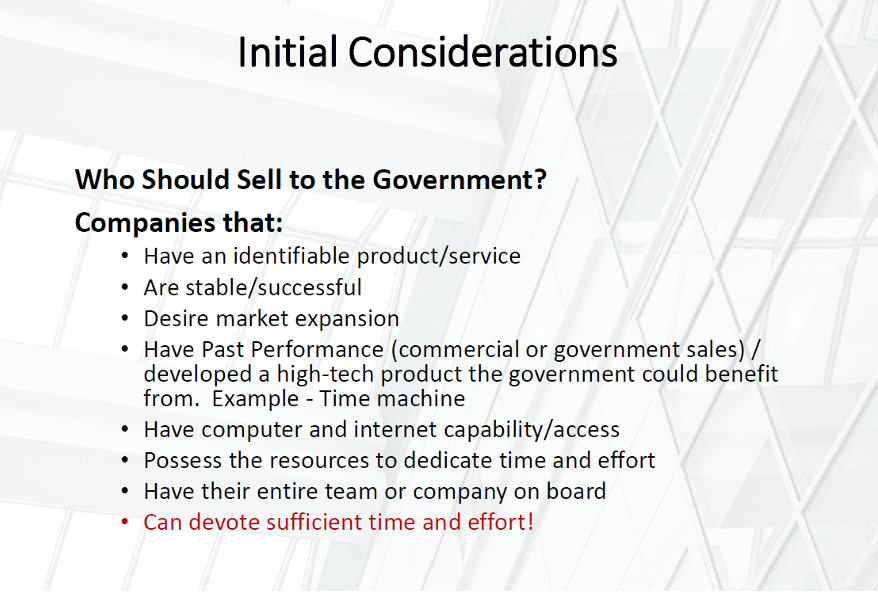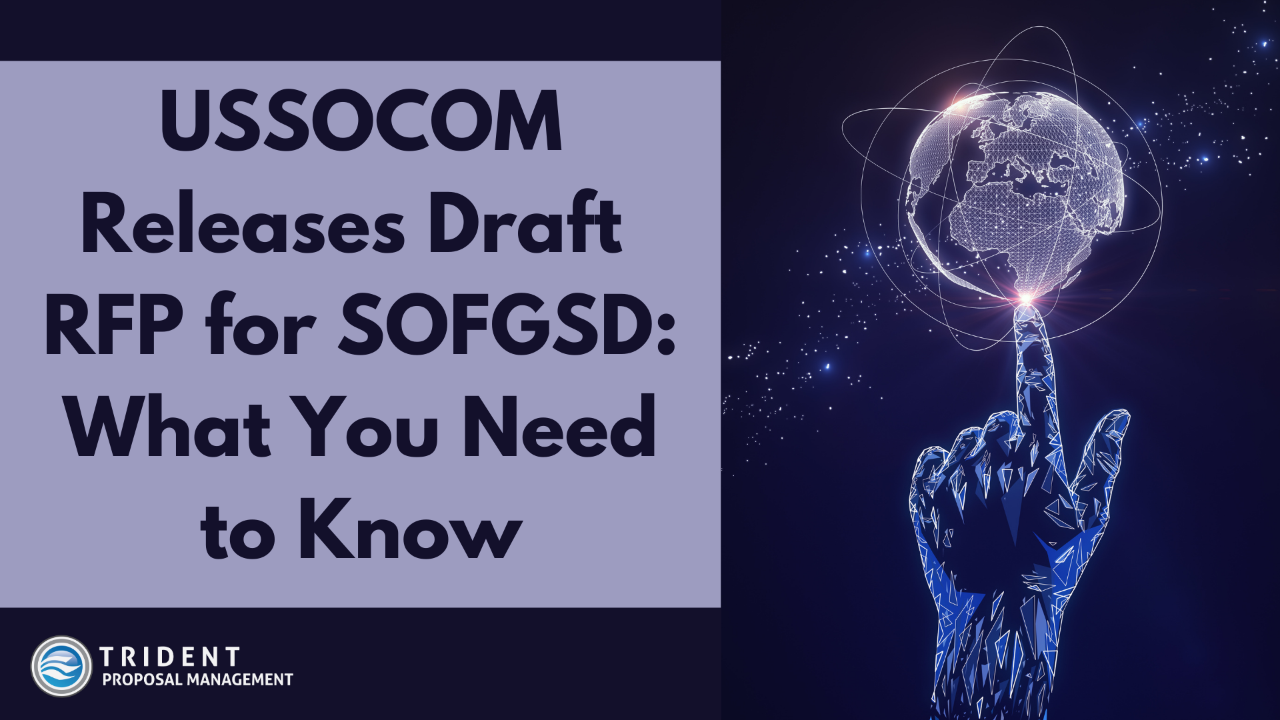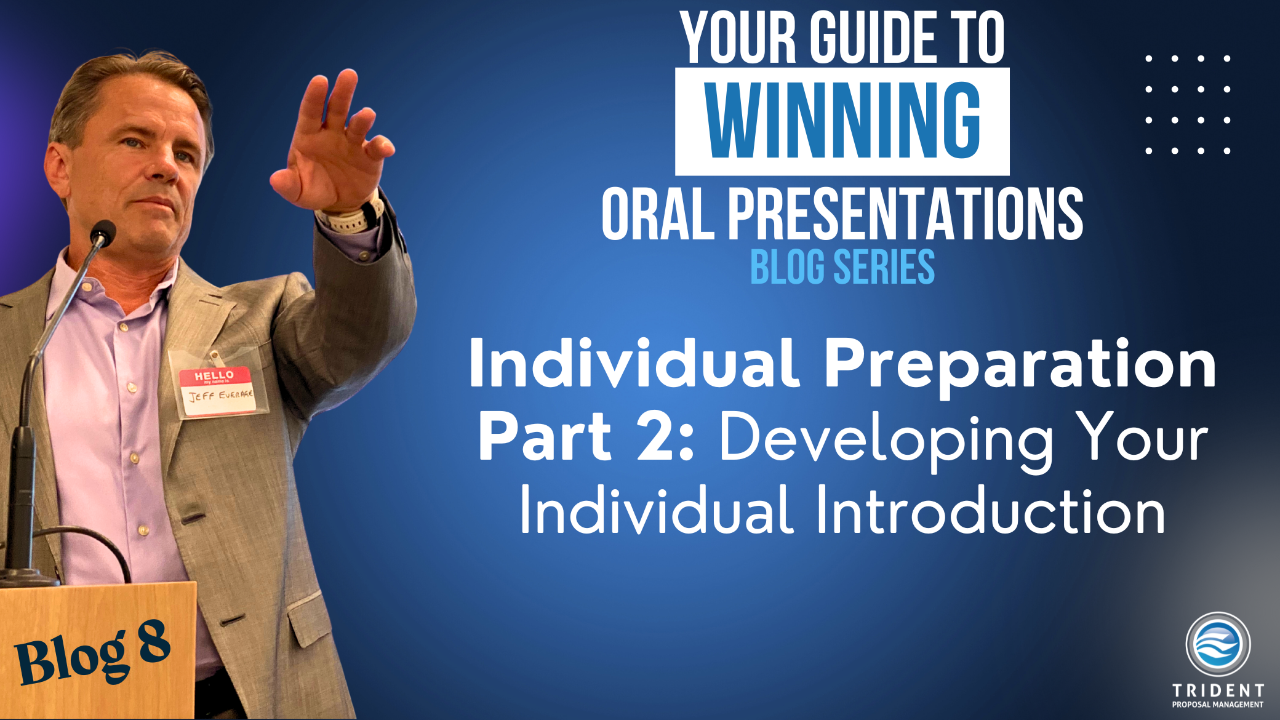Can an APEX Accelerator Program Help You Grow Your Government Contracting Footprint?
Feb 09, 2023
A Business Intelligence Analyst at Trident recently attended a webinar hosted in partnership with Naval Air Systems Command, all about the APEX Accelerators Program. While the bulk of the presentation was an orientation to the APEX Program, there were some great insights for business leaders who may be considering taking the plunge into Government contracting. Check out her summary below!
Old Program, New Name
First, the headlines. The Procurement Technical Assistance Program (PTAP) is a Department of Defense (DOD) resource designed to promote healthy competition of goods and services from the private sector. Since 1985, PTAP has been administered at local levels through Procurement Technical Assistance Centers (PTACs). Starting this year, PTAP will become the APEX Accelerator Program, and PTACs are transitioning to APEX Accelerators. In addition to the new names, ownership of the program has transferred from the Defense Logistics Agency to the Department of Defense’s Office of Small Business Programs (OSBP).
So, what does this program do, and how can it help businesses?
The APEX program plays a critical role in the DOD’s efforts to identify and engage with a wide range of businesses interested in entering and participating in the defense supply chain as government contractors. There are over 90 APEX Accelerator locations across the U.S. and Washington, D.C., Puerto Rico, Guam, the U.S. Virgin Islands, the Commonwealth of Northern Mariana Islands, and in regions established by the Bureau of Indian Affairs. Since APEX Accelerators are funded through cooperative agreements with the U.S. Government, many of the services they provide are FREE to the companies who engage with them. These services may include:
- Training and Special Events
- Government Contracting Assistance (local, state, and federal)
- One-on-one Counseling
- Bid Match Service to find Opportunities
- Government Registration Assistance
- Contracting and Subcontracting Assistance
- Pre-and Post-Award Assistance
APEX Accelerators can be a great resource for small businesses looking to keep overhead expenses down while growing and maintaining their business in the local and federal government markets.
Sounds great – what else do I need to know?
One of the really interesting topics that the PTAC presenter covered was in a section called “Initial Considerations.” After explaining why you’d want to do business with the government, and which agencies you could potentially work with, there was a great characterization of WHO should sell to the government. Here’s the list of attributes the PTAC presenter provided:
While it may not seem like a particularly exciting or innovative list, the presenter summarized some of the biggest roadblocks companies encounter in becoming successful government contractors! Let's dive a little deeper into some of these (not the computer and internet one, though – if you're reading this blog, you've probably already got that one figured out).
- Identifiable Product/Service: At a minimum, you must be able to describe what you are selling and articulate how the government could use it. This is your value proposition. Every solicitation or funding opportunity you respond to is your sales pitch to explain to the Government how what you create or provide will fulfill their need as a customer.
- Stable/Successful: There is a LOT of oversight in government contracting, and for good reason! Aside from wanting to avoid issues with fraud, waste, and abuse, the Government needs to be sure that the contractors they select will actually be able to deliver what they promise. It’s risky business for all parties involved if your company is not on solid, solvent ground.
- Desire to Expand. If you’re not already doing business with the Government, then adding them as a client may require additional infrastructure to meet certain regulatory requirements (think cost accounting, program management, and quality control standards). Those capabilities (if not already in place) may require some level of expansion and investment in new systems, staff, or both. If you’re bidding on multiple contracts or pursuing work with multiple agencies, you may need additional business development (BD) resources – not to mention the additional staff to actually work on the contracts if you win! You must be open to expanding or scaling to meet the demand.
- Have Past Performance or Something Worth Selling. This is another risk reduction measure. The Government wants to see credible examples of where you have successfully delivered similar products or services. Even if you’re not a current government contractor, they will want to know that your technology works, that your people are qualified, and that your business is accountable. When it comes to government contracting, proof is better than a promise.
- Have the resources to dedicate time and effort. You need to keep up with procedural/reporting/administrative requirements, delivery timetables and project milestones, and performance standards. And that’s just when you’re on a contract. It takes significant time and attention to build relationships, respond thoughtfully to solicitations, and identify which contracts you should bid on and when.
- Have the entire team or company on board. Government contracting isn’t something you can dabble in – it requires commitment, and it may take a while to see a return on your investment(s). Additionally, depending on the terms of your contract, your end product or intellectual property may become the Government’s property. For this reason, it is crucial to confirm before you enter a contract that everyone at the company is willing to make the same investment and abide by the numerous regulations.
- Can devote sufficient time and effort. Dedicating time and effort showed up on the list twice! Whether intentional for emphasis or not – this point bears repeating. Finding the right contracts to bid on, submitting a winning proposal, and then executing the work well for the life of the contract demands a certain amount of time and effort, no matter how large and experienced your business is. Make sure you have a plan for your company’s long-term success before you start bidding on everything you see.
It’s a short list, but it represents A LOT of work – especially for small businesses. So where do you go from here?
What it Really Takes
APEX Accelerators and the training/services they provide can give any business a great start in understanding government contracting. But if your company really wants to get on the path to securing government contracts and subcontracts, there’s a little more sweat equity involved. This is where a professional BD resource like Trident can help. We’ve guided hundreds of businesses in defending existing work and winning new contracts by following a proven BD process:
- Identify the addressable market.
- Build and maintain an opportunity pipeline.
- Develop a viable market entry strategy.
If you’re already engaged with an APEX Accelerator, we can amplify the value you get from their resources by helping you apply what you’ve learned to develop a list of validated opportunities you can bid on and win to grow your business. We accomplish this in three ways:
- Our business analysts can integrate and augment your existing BD team to help generate a consistent up-to-date contracting activity for your company’s service offerings and capabilities. We work with your team to identify an addressable market that focuses on matching your services and products with the right government client.
- We help you build and maintain your opportunity pipeline. This allows you to focus on your clients and deliverables. We integrate open-source and subscription databases to identify, validate, and track the contract opportunities that matter to your business to increase the quality and quantity of opportunities in your short- and long-term pipelines.
- We help you develop a market entry strategy to develop well-maintained and impactful relationships with your government clients of interest. We want your functional experts to be able to focus on delivering services and products beyond the client’s expectations.
Want to learn more?
- Talk with Trident! At the end of the day, we believe in providing government contractors and potential government contractors with the knowledge to grow more in their field. Trident’s BD specialists can augment your team in a way that helps you identify and pursue bids that are relevant to your company. Click here to contact us.
- Connect with APEX: The APEX Accelerators can be fantastic resources for companies – particularly small businesses – that want to expand or improve their federal government contracting footprint. After all, many of their resources are local AND free of charge! Visit APEX Accelerators or your local PTAC website.
Written by Ada Stanford Barry and Rebecca Wayland
Ada is a former Business Intelligence Analyst and proposal support specialist. At Trident her specialty is digging into the details for clients. This includes understanding current market trends, finding new opportunities, helping businesses determine what opportunities not to pursue, and identifying areas for growth and expansion. As a military spouse based in Honolulu, Hawaii, she supports clients around the world as part of our globally dispersed team.
Rebecca is our Chief of Staff. Rebecca is a proposal expert offering comprehensive proposal management, capture support, market research, and training. Not only is she the author of The FastProp Process, but she is also our GWAC and MA-IDIQ lead, so if you’re exploring one of these contract vehicles, she is definitely your SME. As a U.S. Navy veteran and military spouse based in Hawai’i, she supports clients around the world as part of our globally dispersed team.



